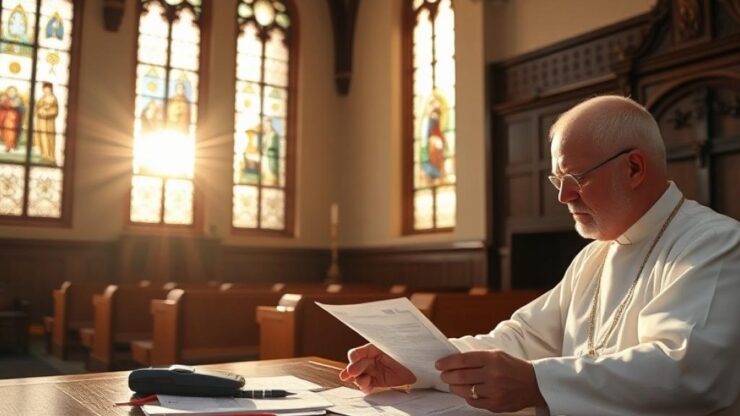Understanding Clergy Tax Deductions

The tax landscape for clergy members often appears convoluted and intricate. Understanding the specific deductions available can significantly alleviate financial burdens. This article aims to demystify the deductions applicable to clergy, enhancing their fiscal awareness and optimizing their tax filings.
Clergy members have access to a range of tax deductions that are not typically available to other professionals. These deductions can lead to substantial savings. Below is a list of some common deductions that clergy can utilize:
- Housing Allowance: This is one of the most significant tax benefits. A portion of the clergy’s salary designated as a housing allowance can be excluded from taxable income.
- Business Expenses: Clergy can deduct ordinary and necessary expenses incurred in the course of their ministry, including travel, supplies, and continuing education.
- Self-Employment Tax Deductions: Since clergy are considered self-employed for tax purposes, they can deduct half of their self-employment tax when calculating their adjusted gross income.
- Retirement Contributions: Contributions made to retirement plans, such as a 403(b), may also be deductible.
Filing taxes as a member of the clergy requires careful attention to detail. The IRS has specific guidelines regarding what constitutes a valid housing allowance and what business expenses are deductible. It is essential to maintain accurate records and receipts to support any claims made on tax returns. Utilizing the services of a tax professional familiar with clergy tax rules can provide additional peace of mind and ensure compliance with all applicable regulations.
Housing Allowance Exemptions for Clergy
The housing allowance exemption stands as one of the most significant financial advantages available to clergy members in the United States. This provision allows eligible clergy to exclude a portion of their salary designated for housing from their taxable income, potentially leading to substantial tax savings. However, the nuances surrounding this exemption can be intricate, necessitating a comprehensive understanding of its parameters and implications.
To qualify for the housing allowance exemption, clergy must ensure that the designated amounts are used for actual housing expenses, which can include mortgage payments, rent, utilities, and maintenance costs. It is crucial to note that the allowance must be formally designated and approved by the employing church or religious organization, typically in the form of a resolution. This procedural step is essential; without it, clergy may find themselves unable to claim this vital tax benefit.
Another layer to consider is the limitation on the amount that can be excluded from taxable income. The IRS stipulates that the housing allowance cannot exceed the lesser of three amounts: the actual housing expenses incurred, the amount officially designated by the church, or the fair rental value of the home, including furnishings and utilities. This cap ensures that the exemption is applied reasonably, preventing potential misuse. Therefore, clergy members must maintain meticulous records of their housing costs to substantiate their claims during tax preparation.
Engaging in strategic tax planning can greatly enhance the benefits derived from the housing allowance exemption. Clergy members should consider consulting with tax professionals who specialize in clergy taxes to navigate the complexities of this exemption effectively. By doing so, they can identify opportunities for maximizing their deductions while ensuring compliance with IRS regulations. Furthermore, understanding how the housing allowance interacts with other deductions, such as self-employment taxes and retirement contributions, can provide a holistic approach to financial health.
Self-Employment Tax Obligations for Ministers
For clergy members, navigating the intricacies of self-employment tax obligations is crucial to maintaining fiscal health. Unlike traditional employees, ministers are classified as self-employed for tax purposes, which necessitates a unique approach to taxation. This classification not only impacts how income is reported but also influences the way taxes are calculated and paid. Understanding these obligations can empower clergy to make informed financial decisions.
Clergy are responsible for paying self-employment taxes, which encompass Social Security and Medicare taxes. The self-employment tax rate is currently set at 15.3%, which consists of a 12.4% Social Security tax and a 2.9% Medicare tax. It’s essential for clergy to grasp the implications of this tax structure as it can significantly affect their overall tax liability.
To help clarify the self-employment tax responsibilities, consider the following aspects:
- Income Reporting: Ministers must report their income on Schedule C (Form 1040) or Schedule SE (Form 1040) and pay self-employment tax on their net earnings.
- Deductions: As mentioned previously, clergy can deduct half of their self-employment tax from their taxable income, which can provide a welcome relief.
- Quarterly Estimated Payments: Given the self-employed status, clergy are also required to make quarterly estimated tax payments to avoid underpayment penalties.
Effective tax planning is essential for clergy to mitigate their self-employment tax obligations. Engaging with a tax professional who specializes in clergy tax regulations can provide invaluable insights into potential deductions and credits. By carefully documenting all relevant income and expenses, ministers can maximize their allowable deductions and minimize their tax burden.
Moreover, it is advisable for clergy to regularly review their financial situation and tax strategy, particularly in light of any changes in church compensation packages, housing allowances, or personal circumstances. This proactive approach can lead to better financial outcomes and help clergy members avoid surprises during tax season.
Record-Keeping Requirements for Clergy Taxes
For clergy members, meticulous record-keeping is not just a good practice; it is an essential component of effective tax management. Given the unique tax circumstances that clergy face, including various deductions and exemptions, having organized and accurate records can make the difference between a smooth tax filing experience and a complicated one. This section delves into the vital aspects of record-keeping that clergy should prioritize to optimize their tax positions.
Maintaining comprehensive documentation is crucial for clergy to substantiate their income and deductions. The IRS requires clear evidence of all claims made on tax returns, and without proper records, clergy may face challenges in case of audits or discrepancies. Here are some key categories of records to keep:
- Income Records: Collect all sources of income, including salary, housing allowances, and any additional earnings from speaking engagements or book sales.
- Expense Receipts: Retain receipts for all business-related expenses, such as travel, supplies, and continuing education. This documentation supports claims for deductions.
- Housing Allowance Documentation: Keep records of the designated housing allowance and actual expenses incurred, including rent, mortgage payments, and utilities, to justify the exclusion from taxable income.
- Self-Employment Tax Records: Maintain a log of self-employment tax payments made throughout the year to accurately report and deduct half of this amount.
- Retirement Contributions: Document contributions to retirement plans to ensure they are correctly reported and deducted.
Establishing an organized system for record-keeping can significantly streamline the tax preparation process. Here are some strategies for effective documentation management:
- Digital Record-Keeping: Utilize accounting software or cloud storage solutions to digitize documents, making it easier to access and organize records.
- Regular Updates: Set aside time each month to review and update your records, ensuring nothing is overlooked and all documentation is current.
- Backup Systems: Regularly back up your records to prevent loss due to technical failures or unforeseen circumstances.
Effective record-keeping not only aids in tax compliance but also provides numerous other benefits:
- Accurate Tax Preparation: With well-organized records, clergy can ensure their tax filings are accurate, minimizing the risk of errors or audits.
- Financial Insights: Regularly reviewing records can offer clergy valuable insights into their financial health, helping them make informed financial decisions.
- Peace of Mind: Knowing that documentation is thorough and organized can reduce stress during tax season, allowing clergy to focus on their ministry and community responsibilities.
Navigating State-Specific Tax Provisions for Clergy
While federal tax regulations provide a framework for clergy tax rules, state-specific provisions can add layers of complexity that ministers must navigate. Each state has its own tax laws, which may vary significantly in how they treat clergy income, housing allowances, and even self-employment taxes. Understanding these nuances is essential for clergy members to ensure compliance and optimize their tax situations.
One of the primary challenges clergy face is the differing treatment of income and deductions at the state level. Some states may recognize the housing allowance exemption, while others may impose taxes on it. Furthermore, the self-employment tax obligations for ministers can differ based on state regulations. To avoid pitfalls, clergy should familiarize themselves with the specific tax rules applicable in their state of residence or employment.
As clergy members delve into state tax provisions, they should pay close attention to the following factors that can influence their tax obligations:
- Housing Allowance Treatment: Verify whether your state allows the exclusion of housing allowances from state taxable income.
- State Income Tax Rates: Be aware of the specific income tax brackets and rates that apply to clergy income in your state.
- Local Tax Regulations: Investigate any local taxes that may apply, especially in urban areas where municipalities may impose additional tax burdens.
- Deductions and Credits: Identify any state-specific deductions or credits available to clergy that could reduce tax liability.
- Filing Requirements: Ensure compliance with state filing deadlines and requirements, which may differ from federal mandates.
To navigate the complexities of state-specific tax provisions effectively, clergy members should consider the following strategies:
- Consult a Tax Professional: Engaging with a tax advisor who is knowledgeable about both federal and state tax regulations can help clergy make informed decisions.
- Utilize State Resources: Many states provide resources and guides for taxpayers, which can offer insights into specific provisions affecting clergy.
- Maintain Accurate Records: Keeping detailed records of income, housing allowances, and deductions is crucial for supporting claims and ensuring compliance with varying state laws.
By proactively addressing state-specific tax provisions, clergy can navigate the complexities of the tax landscape more effectively, ultimately enhancing their financial well-being.
Disclaimer
This article has been created or edited with the support of artificial intelligence and is for informational purposes only. The information provided should not be considered investment advice. Please seek the support of a professional advisor before making any investment decisions.






